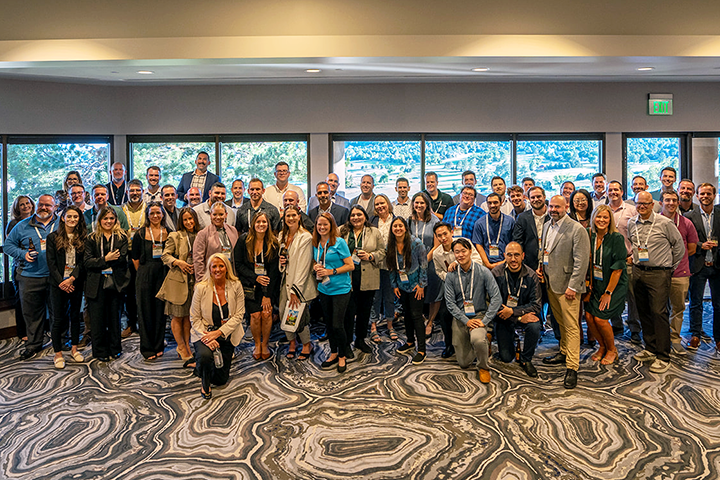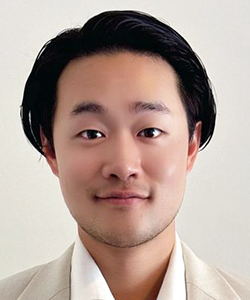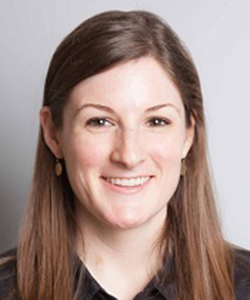Championing Leadership Development
New FEDA YIL Co-Chairs Alex Lu and Meghan Hurst share their leadership experiences and advise young professionals looking to make an impact.

Founded in 2018, FEDA Young Industry Leaders (YIL) seeks to identify and develop talented individuals who are making key contributions and furthering the business goals of the association’s distributor and manufacturer members. The group engages young professionals through leadership development training and by providing opportunities for them to network with their peers and learn directly from top leaders within the foodservice equipment and supplies industry.
The association recently welcomed two new FEDA YIL co-chairs, who will help support these goals. A past FEDA YIL Steering Committee member, Alex Lu is the president of Restaurant Equipment Market, an Atlanta-based dealer that operates a 20,000-square-foot retail store and a 150,000-square-foot warehouse facility. Joining him as co-chair is Meghan Hurst, the vice president and general manager for Vulcan, an ITW Food Equipment Group company.
The following Q&A covers Lu and Hurst’s own leadership experiences and why they believe other young professionals can benefit from being involved in FEDA YIL.

Alex Lu
President
Restaurant Equipment Market

Meghan Hurst
Vice President and General Manager
Vulcan
Can you give us a brief background on your career and journey into a leadership position at your company?
Alex: My career journey started in the family business from as early as I can remember. I like to joke that my first customer delivery was at six months into my mom’s pregnancy! Growing up, I’d spend time at work in an actual 44-gallon Cambro container, which kept me safely contained while my parents were busy. Customers even held me while waiting for quotes.
Starting from fourth grade, I worked summers across various entry-level roles. By college, I was balancing classes in the evenings with full-time work, committed to mastering every role I held. Whether cashiering or operations, I wanted to be the best in each role, learning every layer of the business from the ground up. Over time, I shifted to working on the business — hiring, developing sales and operations teams, implementing processes, and modernizing our systems. That gradual evolution into leadership felt natural, building on the foundation I’d been fortunate enough to gain early on.
Meghan: Upon graduating from college, I joined a direct response marketing agency where I was responsible for developing plans and campaigns to enable our nonprofit and association clients to hit their fundraising goals. After a few years at the agency, I returned to school to earn my MBA with the intention of propelling myself into a corporate setting. I joined a pork manufacturer in 2011 and worked as a category manager responsible for the product mix, pricing and packaging of the retail and foodservice SKUs (stock-keeping units) in my categories. I then spent a couple of years at Dansko Footwear where I developed occupational marketing programs targeting chefs, teachers and healthcare professionals to drive awareness and purchase of the brand.
In 2014, I joined Vulcan in Charlotte, North Carolina. I was initially tasked with marketing, new product development and sales enablement for fryers, griddles and charbroilers. Over the past 10 years, my product and people responsibilities have grown. In 2022, I became vice president of sales and marketing, with oversight of customer service, business development and marketing. On Jan. 1, 2024, I became vice president and general manager of Vulcan, meaning I have full profit and loss responsibility and am charged with leading the team in pursuit of our goals.
What role have mentors played in your leadership development? What’s one invaluable insight or realization you gained from a mentor and how did it shape your leadership style?
Alex: Mentors have been incredibly grounding, like a breath of fresh air, especially when I’ve felt overwhelmed or uninspired. The guidance from industry mentors — whether through buying groups, FEDA or relationships I’ve built along the way — has shaped so much of my perspective.
One powerful insight a mentor shared was about the importance of people over ideas. Early on, I was drawn to the excitement of fast-paced innovation, assuming the strength of an idea would carry a business. But the truth is, no matter the idea, having the right people is what creates real impact. I’ve come to embrace the saying: “If you want to go fast, go alone; if you want to go far, go together.” That wisdom has influenced my approach to leadership — balancing a firm hand with compassion to build and empower a team.
Meghan: Mentors have played an important role for me during my career, most notably as a source of feedback and guidance and as a means to make connections with others. I do think it is important to acknowledge that the mentee should be structured in the relationship — coming prepared with topics and making progress on the actions discussed. One of my first mentors demonstrated that she wasn’t afraid of rolling up her sleeves and helping the team accomplish the task at hand. These were lessons I learned early on — around building followership, collaboration and being genuine and also never asking anyone to do something you would not do yourself.
Why are groups like FEDA Young Industry Leaders valuable for developing leadership skills?
Alex: When I entered the industry at 18, I found myself feeling intimidated and disconnected at conferences, where I often saw seasoned professionals instead of peers. Groups like FEDA YIL changed that. They provided an inclusive environment where I could find individuals to connect with, learn from and grow alongside, making me feel like I belonged in this space.
Meghan: The path to developing and strengthening leadership skills never ends. With a continuous improvement mindset, one can always find ways to better motivate, inspire, lead and hold teams accountable. Having organizations like FEDA YIL is a convenient way to have access to skills development.
What are some of the concerns you see in young professionals working to establish themselves in our industry and how can groups like FEDA YIL help to address those?
Alex: One challenge is making the foodservice equipment industry feel dynamic. Most people don’t grow up dreaming of working with cookware or industrial equipment, so it’s easy to overlook how rewarding it can be. FEDA YIL brings together young professionals, creating a network where they can find purpose and share ideas.
Meghan: One area that I have and will continue to navigate is around integrating work and life. Lots of people talk about the evasive notion of “balance.” I think it is more about integration, being efficient with your time and setting priorities — you can have a very full family life and a very full and ambitious professional life.
What are other resources or groups you would recommend that young leaders explore? What did you find valuable about them?
Alex: Starting young in this industry, I often struggled to find peers in similar roles. Groups like EO (Entrepreneur Organization) and YPO (Young Presidents’ Organization) became invaluable for me. These groups offer a small, trusted cohort of individuals who share openly across business and personal topics. It’s been incredible to have a space to grow and support one another through every facet of life.
Meghan: ITW has excellent employee resource groups (ERGs) including the ITW Women’s Network or the Young Professionals Network. I encourage folks to research what may be available to them within their own organizations or within their community, such as young professional groups within a local chamber of commerce. Most valuable is the opportunity to connect with people having similar experiences — and to brainstorm ideas and solutions.
What excites you about being a co-chair of FEDA YIL and what are your goals for the group?
Alex: I’m genuinely excited to connect with other YIL members and see the innovative ideas we can bring to life together. The best connections I’ve had often happen informally, so one of my goals as co-chair is to foster an environment that encourages that kind of spontaneous, meaningful interaction. I’d love for the group to feel like a close-knit team, always learning and evolving together.
Meghan: As a manufacturer, I am intimately familiar with the value that dealers provide within equipment and supplies and I am excited about getting more involved with FEDA. Specific to YIL, I look forward to working with the group on attracting and retaining great young talent to our industry! The talent we have on our teams are critical enablers to driving the growth of this industry.
What advice would you give to other young people in the foodservice equipment and supplies industry as they move into leadership positions?
Alex: One key piece of advice I’d offer is to prioritize thoughtful recruitment. Hiring isn’t just about filling roles; it’s about building relationships. When you bring someone onto your team, you’re also taking on a mentorship role, becoming the person they trust to help navigate challenges. Solving problems together strengthens that bond and fosters a team dynamic where everyone is committed to mutual success. Lastly, don’t hesitate to seek support, whether from mentors, peers, or industry groups — we’re all here to help each other succeed.
Meghan: Work hard and do what you say you are going to do. There is a lot of power in following up and following through — this commitment can be a way to differentiate yourself from others.

